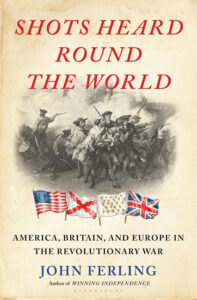BOOK REVIEW: Shots Heard Round the World: American, Britain, and Europe in the Revolutionary War by John Ferling. (Bloomsbury Publishing, 2025) $40.00 Hardcover.
John Ferling gives readers another history of the American Revolution with his 2025 work, Shots Heard Round the World: America, Britain, and Europe in the Revolutionary War. Despite that label in this being one of what is surely thousands of histories of the war, Ferling adds a different dimension to his work. As indicated by the title, this is the American Revolution with more international focus than other histories might offer.
 First, this is a tale of the American’s triumph over Great Britain to secure independence. Ferling documents the opening shots at Lexington and Concord, early moments that tried the abilities of Gen. George Washington in the form of the Battle of Long Island, triumphs at Trenton and Princeton, Gen. Horatio Gates’ defeat of Gen. John Burgoyne at Saratoga, General Washington’s victory at Yorktown, and more.
First, this is a tale of the American’s triumph over Great Britain to secure independence. Ferling documents the opening shots at Lexington and Concord, early moments that tried the abilities of Gen. George Washington in the form of the Battle of Long Island, triumphs at Trenton and Princeton, Gen. Horatio Gates’ defeat of Gen. John Burgoyne at Saratoga, General Washington’s victory at Yorktown, and more.
British Gen. Henry Clinton receives considerable attention in the later parts of the war as does his predecessor in the earlier years, Gen. William Howe. After France officially joins the war in 1778, Ferling gives due to all those figures from that country like the Marquis de Lafayette, comte de Grasse, and comte de Rochambeau.
This is not what makes Ferling’s work different. After all, any history of the American Revolution needs to have a certain degree of European history included because of the involvement of Great Britain and France. Ferling goes a step further in weaving into his narrative the careers of other European statesmen that played an impactful role. One of those statesmen was Charles Gravier, comte de Vergennes. Working as foreign minister for France for the war’s entirety, Vergennes served his country in many ways, from keeping a close eye on the war in its early years, to reluctantly countenancing Spain’s desire to invade Great Britain (which never came about), and being involved in peace negotiations to end the war.
British Secretary of State for the American colonies Lord George Germain gets a similar treatment. Ferling communicates to the reader the difficult task Germain faced during the war in trying to coordinate war plans with General Howe and General Clinton from thousands of miles away, often not able to fully grasp the war effort and the logistics of achieving victory. Spain also gets its due with Ferling stating it hoped to recover Gibraltar, Minorca, and Florida as a result of the war.
Ferling creates a fluidity between the familiar and the newer histories presented. There is not a separate chapter or part of the book where he writes about the war’s global aspects. Vergennes, Germain, and others more appropriately have their place among other statesmen, like British Prime Minister Lord Frederick North, consistently in the book.
One shortcoming of Ferling’s work involves organization, specifically maps, and battles. A series of maps are included after the table of contents, but each battle does not get its own map on its respective pages. For the reader already familiar with the military history of the revolution, this is a minor omission that can be ignored, but for the uninitiated, it could be hard to grasp the movements of armies and decisions of commanders without a visual aid to accompany descriptions.
On the question of an audience, A Shot Heard Round the World would be for those looking to have a deeper understanding of the revolution not just for its battles, but for its administrative and diplomatic history on a broader geographic scale. Although Ferling’s work gives credit to the triumphant General Washington on the battlefield and names like Adams and Franklin for their diplomatic work, it conditions the reader to see this war effort in a different light with a keener eye for its global impact.






Recent Articles
A Strategist in Waiting: Nathanael Greene at the Catawba River, February 1, 1781
This Week on Dispatches: Brady J. Crytzer on Pope Pius VI and the American Revolution
Advertising a Revolution: An Original Invoice to “The Town of Boston to Green and Russell”
Recent Comments
"A Strategist in Waiting:..."
Lots of general information well presented, The map used in this article...
"Ebenezer Smith Platt: An..."
Sadly, no
"Comte d’Estaing’s Georgia Land..."
The locations of the d'Estaing lands are shown in Daniel N. Crumpton's...